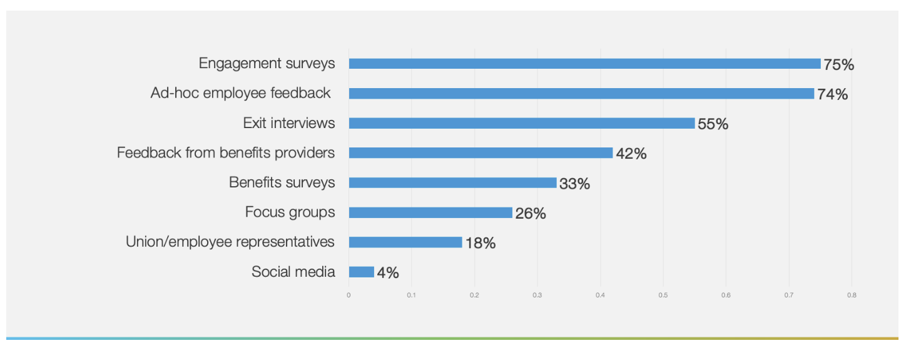The Benefits of Proactive Employee Listening
Why proactive employee listening is a key tool for employers in managing their global benefits
Increased employee listening has been a focus area of many multinational employers over the last couple of years. Whilst this may be partly attributed to the need to stay close to employees while they were working remotely during the COVID-19 pandemic, it also spoke to a drive amongst employers to be more mindful of how they reinforce the employment deal.
In the current talent market, ensuring that the employment deal resonates with employees has become even more pressing, both for retaining key talent and for attracting new hires. Getting valuable, actionable feedback from employees is essential to ensure that programs evolve in the right direction. Moreover, against the increasingly challenging economic backdrop, it is essential to ensure that every benefits investment a company makes is well targeted.
Identifying employees’ needs and wants is particularly important when it comes to benefits. The challenge is that many elements within the typical benefits program can be hard for employees to understand. If benefits are not well understood they are unlikely to be fully appreciated. Checking in with employees on both the level of understanding and on how the benefits are relevant to employees’ needs and wellbeing – now and for their future – is the only way to gain meaningful insights on whether benefits are really benefitting employees.
Gaining an understanding of how employees perceive the more complex benefits – typically retirement/pensions and medical/healthcare benefits – is particularly important. These benefits often include jargon which can be a barrier for many employees. Moreover, these tend to be “low touch” benefits – employees may only access information about them occasionally – and awareness and appreciation tends to erode naturally over time. In Asia, for example, there is usually a significant difference in employee understanding of outpatient/clinical benefits, which tend to be quite simple and are accessed regularly, and inpatient/hospitalisation benefits, which are only accessed when needed and are often full of insurance terms and conditions. Moreover, the more complex benefits are often the most costly for employers to provide, making it all the more important that employees appreciate what is provided.
In light of focus on employee listening, we found the results of our MBWL Global Benefits Priorities Survey Results 2022 of multinational employees very relevant. With regards to employee listening on benefits, our survey revealed the following results:

Whilst it was reassuring to see the high use of engagement surveys amongst respondents, these tend to ask a broad range of questions around the employee value proposition. There may be one or two questions to assess overall appreciation of benefits, which is useful in itself in terms of monitoring trend from one year to the next, or to gauge appreciation against market norms. However, when it comes to benefits, more probing questions are needed to really understand what employees think.
The second most cited source of feedback was ad-hoc employee feedback. Whilst ad-hoc feedback can provide insights on areas that are worthy of further investigation, it may not always be representative of the entire employee population. The same is typically true of relying on feedback from exit interviews – are the views of leavers really the same as those of the wider population?
Stay interviews can be an effective way of finding out how employees view their benefits, and critically whether benefits are helping to retain them. The informality of such conversations should encourage employees to feel safe to express their opinions. The format is perfect for asking how things could be improved.
So what should employers do?
We believe that employers should proactively seek specific feedback on benefits.
Only 26% of respondents to our survey said they used focus groups. A hosted focus group is potentially one of the best ways of gathering employee views. The host can provide context on the benefits, then ask questions about them. This ensures there is a common understanding of the benefits in question, and employee feedback is then provided based on the facts rather than a perception of what the benefit is.
Voting software can be used in the focus group session to pose initial questions and obtain responses that reflect the combined view of all attendees, which can then be followed up with probe questions to explore why the responses are as they are.
Voting tends to be engaging for attendees – it is interesting for them to see what the group thinks as a whole, and it can stimulate further thoughts, particularly if their personal view is different to the group as a whole. Voting also has the benefit of providing quantitative feedback, which can be very useful for making the business case for any change. Management teams are typically more receptive to numbers than to qualitative feedback alone.
A benefits survey is another way of proactively collecting employee views. 33% of respondents to our survey said they used this approach.
Ideally such a survey should not take too long for an employee to complete, so a pulse survey of between 5 and 8 questions is usually a good target. A pulse survey is ideal for either finding out overall views on benefits – or for delving more deeply on a particular benefit.
It is important that the survey provides brief context on the benefit plans in question, so that the employee answers with the key facts front of mind, rather than relying on a recollection of what the benefit is. The key challenge with any survey is encouraging participation – particularly where awareness and appreciation of benefits may be low. Providing a small token for completion – or entering the participant into a draw for the chance of winning a bigger prize if they complete the survey can encourage higher participation.
We would recommend that in any review of benefits, seeking employee feedback should be a key part of the process alongside cost, competitiveness and other business / talent priorities. 27% of respondents to our survey said that they considered employee fit when designing or reviewing benefits, which was lower than we might have expected and lower than the 35% of respondents who cited benchmarking as a key input to any review. Whilst it is important to be aware of what the market is doing, we would consider employee fit to be equally, if not more, important than peer group benchmarking – making sure at the benefits resonate with your employees.
Employee feedback may be sought on the current benefits as an initial input to the review process. Alternatively it can be to test out views on potential changes. Typically a hosted focus group is a very effective way to explore new ideas, as the host can manage expectations around the changes being proposed.
The competitive advantage of proactive employee listening
As the global war for talent continues to intensify, and as many organisations aim to grow in new markets worldwide and into new business areas, successful organisations must provide and promote benefits that people want – and have well-defined, consistent ways to understand what benefits are attractive to their employees around the world.
Only by analysing the employee perspective in a robust way, alongside cost, competitiveness and other business / talent priorities, can a complete fact-base be formed to enable evidence-based decision making and strategy development around benefits worldwide.
Obtaining proactive feedback from a representative sample of employees provides much more meaningful insights into what employees think of their benefits than relying on more reactive feedback. Employee participation should take into account diversity equity and inclusion criteria to ensure a broad range of viewpoints are considered.
Seeking employee feedback on their benefits can help boost engagement as employees feel like stakeholders in their future. However, if you are asking for feedback it is important that there is follow up – to report back on the results to participants and explain what actions are planned next.
Proactive employee listening should be a key part of any review of benefits. Like marketing any product, where it is important to understand what the consumer wants, it is critical to understand how benefits fit with employee needs. Employee feedback can also help inform decisions around communication and roll-out, to ensure initiatives are well targeted.
In summary, proactive employee listening is a key tool in managing benefits effectively. Employees who feel they are well supported by their employers are usually more engaged and more productive. Well targeted benefits are a key part of such support. Global organisations who take a strategic approach to employee listening will achieve more consistently positive results worldwide, in terms of benefits appreciation and engagement.
We will be launching our MBWL Global Benefits Priorities Survey 2023 shortly, to see how global organisations’ benefits priorities might have changed over the last year. In particular, we will be looking to test the statement that an organisation’s employee benefits strategy has a direct impact on the overall resilience and wellbeing of its people and business.
Participate and be part of the conversation.
Contacts

John-Paul (JP) Augeri
Managing Director and Global EB Consulting Leader, Milliman
VIEW PROFILE
Email:
johnpaul.augeri@milliman.com
Tel: +1 347 541 1146
John-Paul (JP) Augeri
Managing Director and Global EB Consulting Leader, Milliman
A global human capital and risk management leader with wide-ranging technical and management experience.
JP joined Milliman to lead the Global Employee Benefits Consulting Practice, in partnership with MBWL. He has over twenty years’ experience helping multinational clients to design, deliver and manage programs globally across pensions, benefits and M&A. He specialises in solving complex global issues and delivering value and innovation to multinationals and their employees.
His expertise includes: global pensions and benefits; M&A; funding, investment, and derisking strategies; change management; total rewards and employee experience; global client management and business development.
He has also served as a board chair and senior advisor, as is a frequent external speaker who has helped lead several client roundtables.
JP is a Fellow of the Institute of Actuaries in the UK, and he has lived and worked in the US, UK, Germany, and Austria.

Mark Whatley
Principal and Consulting Actuary, Milliman
VIEW PROFILE
Email:
mark.whatley@milliman.com
Tel: +65 63272311
Mark Whatley
Principal and Consulting Actuary, Milliman
A highly driven employee benefits and retirement specialist internationally.
Mark provides independent and objective consulting advice on employee benefits to multinationals, local companies and government-linked organisations.
Mark has over 23 years of employee benefits, retirement and financial services experience gained in Asia, Europe and Africa.
Before joining Milliman, Mark headed Willis Towers Watson’s benefits consulting business in South East Asia for over seven years, with teams in five countries.
Mark is an expert on benefits and retirement practice in each market in the region, gained from single and multi-country project experience, including; benefits review and optimisation, retirement plan design, retirement actuarial valuation, retirement and benefits administration, flexible benefits design and pricing, benefits communication, pre-M&A benefits due diligence and post-M&A benefits harmonisation. He has also worked on several multi-streamed HR transformation projects across the region.
Contacts

John-Paul (JP) Augeri
Managing Director and Global EB Consulting Leader, Milliman
VIEW PROFILE
Email:
johnpaul.augeri@milliman.com
Tel: +1 347 541 1146
John-Paul (JP) Augeri
Managing Director and Global EB Consulting Leader, Milliman
A global human capital and risk management leader with wide-ranging technical and management experience.
JP joined Milliman to lead the Global Employee Benefits Consulting Practice, in partnership with MBWL. He has over twenty years’ experience helping multinational clients to design, deliver and manage programs globally across pensions, benefits and M&A. He specialises in solving complex global issues and delivering value and innovation to multinationals and their employees.
His expertise includes: global pensions and benefits; M&A; funding, investment, and derisking strategies; change management; total rewards and employee experience; global client management and business development.
He has also served as a board chair and senior advisor, as is a frequent external speaker who has helped lead several client roundtables.
JP is a Fellow of the Institute of Actuaries in the UK, and he has lived and worked in the US, UK, Germany, and Austria.

Mark Whatley
Principal and Consulting Actuary, Milliman
VIEW PROFILE
Email:
mark.whatley@milliman.com
Tel: +65 63272311
Mark Whatley
Principal and Consulting Actuary, Milliman
A highly driven employee benefits and retirement specialist internationally.
Mark provides independent and objective consulting advice on employee benefits to multinationals, local companies and government-linked organisations.
Mark has over 23 years of employee benefits, retirement and financial services experience gained in Asia, Europe and Africa.
Before joining Milliman, Mark headed Willis Towers Watson’s benefits consulting business in South East Asia for over seven years, with teams in five countries.
Mark is an expert on benefits and retirement practice in each market in the region, gained from single and multi-country project experience, including; benefits review and optimisation, retirement plan design, retirement actuarial valuation, retirement and benefits administration, flexible benefits design and pricing, benefits communication, pre-M&A benefits due diligence and post-M&A benefits harmonisation. He has also worked on several multi-streamed HR transformation projects across the region.